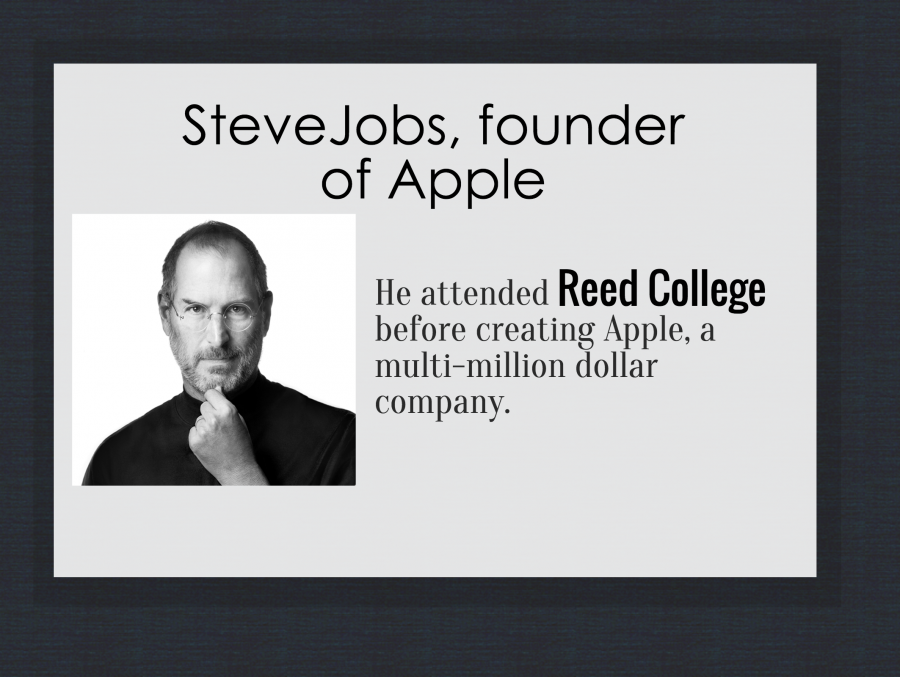Going into freshman year, my biggest concerns included finding the WAUD and picking out the perfect color-coordinated folders. Then, I engaged in my first “college talk” with a random stranger over hors d’oeuvres at a stuffy grown-up dinner party. That’s when I realized I was going to have bigger problems than locating W108 over the next four years.
By now, I’ve probably had over a hundred conversations about “what the future holds for me.” Each exchange—or rather, each interrogation—is comprised of the same questions: What colleges are you looking at? How’s your GPA? When are you taking the ACT and SAT? What will you major in? Do you want to follow in your parents’ footsteps?
I get that people are curious and think that this is an exciting time because we’re about to take our first leap forward in life. But most fail to recognize the negative ramifications these seemingly miniscule conversations can have on teenagers’ perception of college and their futures.
I’ve heard stories of people choosing to apply to higher-ranked schools than their dream institutions because they’re worried about what their parents or community will think of them.
“If you limit your search to the same 200 schools where everyone else is also applying, you are shortchanging [yourself],” a recent Huffington Post article stated. “It turns out that your future happiness at work and at home has more to do with what you do at college than where you went to school, according to a recent poll by Gallup and Purdue University.”
The name of the college I attend shouldn’t matter. Just because a school is lesser known doesn’t make it inferior.
Let’s think. Steve Jobs went to Reed College before creating Apple, and he’s Steve Jobs. George Clooney went to Northern Kentucky University, and he has three Golden Globes and two Oscars hanging on his mantle. Evan Williams attended University of Nebraska-Lincoln before becoming a co-founder of Twitter, and currently has a net worth of 1.91 billion dollars.
Now, have you ever heard of Quincy Apparel? Harvard Business graduate Christina Wallace created the company, and the corporation fired Wallace as CEO within a year. Days later, it closed for good. Attending a top-tiered school doesn’t make you bound for success and going to a lower-profile school doesn’t make you bound for failure. College, and the world in general, doesn’t work like that.
At any school, including places like Harvard, you can find highly-motivated, innovative, intelligent young adults who will positively shape the world for future generations. Likewise, at any school, including places like Harvard, you’ll find the sleazy, sluggish, simple-minded students who will sleep until three and visit the dining hall more than the lecture hall.
The novelty of being in college is that you get to choose which type of student and person you want to be.
Your experience won’t be measured solely by the name on your acceptance letters; it’ll be measure by the opportunities provided, the cultivation of new relationships and exploration of identity. This is a chance to forge your own educational path and to find your niche—you can go after your passion at any school.
I’m not saying you shouldn’t shoot for Harvard or Maryland or Northwestern or whatever prestigious institution, if that’s what your dream school is. But make sure that it’s just that: YOUR dream. Not your parents’, or society’s or a random stranger’s during hors d’oeuvres.
A person’s intelligence goes beyond their spot on the yardstick with a few numbers between 1-4, or 1-36, or even 600-2400. There’s more that defines a person than four short years in high school. And whatever college or university you end up at, everything will be OK.
So the next time we’re conversing over crab cakes and bruschetta, please, just ask me about anything else.










purdue university west lafayette in • Jun 4, 2016 at 2:25 am
Wow! At last I got a website from where I know how to truly take helpful information concerning my
study and knowledge.
Voice of reason • Apr 12, 2016 at 6:41 pm
Good article. Besides pressure to try to get into certain colleges there’s the pressure of just going to college in general. Not every career requires a college degree and arguably only certain degrees are truly worth it (STEM?).
pinkandpurple • Mar 24, 2016 at 12:58 pm
GO JENNAH!!!! HELL YEAA!!! <33333
The Listener • Mar 22, 2016 at 1:44 pm
^Thoughtful Terp? Whered u think of that name? On planet MARS?
Anonymous • Mar 21, 2016 at 3:27 pm
THANK YOU SO MUCH. Great article!
Bill Nye • Mar 21, 2016 at 10:51 am
I’m pretty sure you don’t hang Oscars and Golden Globes from your mantle. You should gently place them on the mantle. The titanium-gold alloy that makes up the Oscars and Golden Globes statues is nowhere near strong enough to withstand the forces. Let’s look at it.
Let’s use a golden globe statue. One statue weighs 5.5 pounds or about 2.5 kilograms. Using that we can solve for the gravitational force acting on the statue. Fg=2.5(9.8)=24.5 Newtons. After researching the Newton torque constant of a titanium gold alloy, we can see that it is only 22.3 Newtons. Therefore, the statues would not be able to be hung on the mantle.
Bob Vance of Vance Refrigeration • Mar 21, 2016 at 10:57 am
Preach
Thoughtful Terp • Mar 21, 2016 at 9:50 am
Thank you,
Your article is well written and motivational. The Whitman stigma against attending an affordable and realistic college over the ol’ ivies just puts unnecessary pressure on young folks who want to succeed but cannot afford six digit tuitions or are simply unsure what their path will be. Power to those kids who can ignore the shallowness of acceptance posts and Dartmouth sweatshirts and focus on their futures alone.